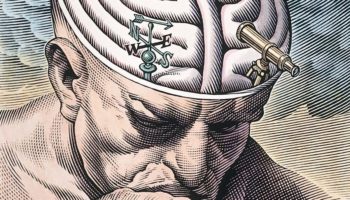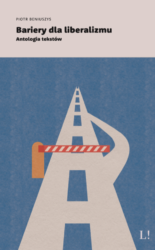Ever since Law and Justice (PiS) came to power, the voices of those who think that the liberal formula has been exhausted or at least needs a solid modification have manifested with particular intensity.
Today, a new “liberal-social” political project is due to start, and in February a left-wing “opposition savior” who even more strongly contests allegedly wrong ideas of liberalism is expected to arrive on a white horse. The problem is that these ideas are difficult to blame for the errors of the last period, because for many years they have been left untouched among the increasingly dusty books.
Apparently, before 2015, Poland was ruled by liberals who did not understand society and pushed for extremely neoliberal, antisocial politics. What’s more, after their defeat (which of course resulted from their liberal economic policy) these liberals did not draw any conclusions and they have not changed at all, which is why the authoritarian PiS came to power and restored dignity to people through the mass redistribution of cash.
If only someone understood the disadvantages of the free market and changed the face of the anti-PiS opposition…
There is everything in this fairy tale. There is a bad tyrant, there are inept rebels, there is waiting for a prince on a white horse. Only one thing is missing. As it happens with fairy tales, it does not have the slightest contact with reality.
Those who are called liberals in this fairy tale spread with such flair by left-wing columnists, although having increased the retirement age according to the principles of common sense and responsibility for the state, on the occasion they also nationalized private pension savings. They also increased VAT (supposedly for two years), and when there was a strike by miners, instead of taking a bold decision and privatizing the mines, they bowed to trade union violence. It is therefore hardly surprising that in the end the electorate of these “liberals” said “enough” and decided to support a new, free-market initiative of a well-known economist.
What happened next? When the vote on the PiS’s flagship social program took place, the „liberals” made a 180-degree turn and supported the populist bill, promising that when they came to power, it would involve even more children. Having no idea for their further existence in the opposition, they managed to additionally promise 13th pension and withdraw from any criticism of new social government programs.
I am not saying, of course, that the 8 years of Civic Platform (PO) in power is a time of raging socialism and an extremely illiberal period in the history of Poland, but calling it liberal politics is quite an abuse. These were technocratic governments, a period of “hot water in a tap”, characterized primarily by the abandonment of ambitious visions.
And how did the story of the new liberal party (Nowoczesna) unfold? At first everything went great. Less than 8% in the parliamentary elections and a rapid increase of up to 25%. The new leaders managed to skillfully combine the criticism of populism in economic policy and proposals to reduce state interference in the lives of individuals with the defense of institutions guarding the rule of law.
Unfortunately, the Spanish expedition of its leader showed how fragile this support was. The party got lost. Despite the change in the authorities, it was unable to regain clarity and began to become the younger clone of the PO. A sad picture was its leader signing the declaration of maintaining 500+. Ultimately, only 55% of the voters of Nowoczesna voted in the local elections for its coalition with PO.
Following the advices of left-wing publicists, the opposition Coalition, instead of tax cuts or a good climate for investors, postulated free services from local governments, fighting the „republic of developers” (exceptionally stupid slogan) or free dinners in schools (the author still remembers lunch canteens in early years of elementary school and sincerely sympathizes with the stomachs of future generations of students).
There was no criticism of the inflated public spending in the statements of the opposition politicians. The coalition supported the 500+ program, and its main subject began to propose the 13th pension. What was the effect? The election result is almost the same as PO achieved alone 4 years ago. If something was responsible for such a result, it certainly was not liberalism, which was actually not present in the Coalition programs.
The creator of liberalism, John Locke, wrote that the purpose of government is to create laws for regulation and protection of property and to defend the community against external aggression. Alexis de Tocqueville warned against administrative despotism and saw the contradiction of socialism with democracy.
John Stuart Mill wrote about freedom of speech that “If all mankind minus one, were of one opinion, and only one person were of the contrary opinion, mankind would be no more justified in silencing that one person, than he, if he had the power, would be justified in silencing mankind”.
Twentieth-century liberals, like Ludwig von Mises and Friedrich von Hayek, defended the free market and warned against the tyranny of the all-powerful government. There is no significant political party in Poland today that would change this tradition into a political program.
Meanwhile, Poland’s political problems are largely due to the lack of liberalism, not its excess. State-owned companies, whose percentage we have the largest among OECD countries, are used to sponsor galas of weekly magazines supporting the government and campaigns against independent courts.
Public television serves as a propaganda tool for the government, and thanks to state funding it can not fall. The opposition got tricked into the bidding for social programs that Tocqueville warned against two centuries ago and can neither win the election nor gain credibility.
The political opponents of Law and Justice do not think to counter the narrative of „restoring the dignity of Poles” through social programs, not seeing the absurdity in the concept of dignity coming exclusively from the good will of the rulers. Likewise, it happened with the case of a solidarity tax signed yesterday by the President, which was criticized by employers’ organizations, experts and the disabled themselves, for whom it was reportedly created.
Also, the question of freedom of speech is in a bad shape. Almost all participants in the public debate are tempted to fight the opponents with the penal code, regardless of whether it is a printer who refused to print the LGBT organization leaflets, the issue of „insulting the religious feelings” or the parody of the national anthem. In the atmosphere of an acute dispute, it is difficult to ask whether we want the prosecutor to decide on the admissibility of expressing views.
The author does not write all this for pure complaining, but to make the readers aware of the universality and validity of libertarian concepts. Although created in the 18th and 19th century, the ideas of a small government limited by the law, individualism, economic freedom and natural rights of the individual still remain the best guarantee of a good citizens’ life.
Their problem is not a supposed defeat in the confrontation with reality (the correlation between freedom and prosperity and poverty reduction is obvious to anyone who at least looked at historical statistics), but being inattractive to politicians. Eventually, hardly any of the party leaders would not like to start their ruling with free air time on public TV and a number of supervisory boards in state-owned companies.
Acceptance of arbitrary prohibition of views of more extreme political opponents also sounds tempting, especially when the subordinate minister of justice is also the general prosecutor.
If the three-year rule of Law and Justice taught us something, it is the danger resulting from the extensive competence of the state. This is what the creators of liberalism warned us about. The Financial Supervision Authority may warn against questionable deposits, or it may be used to implement the “Zdzisław plan” against the rebellious financier.
Subsidies for magazines can support niche, ambitious titles, they can also be used to keep pro-government weeklies in good shape. A preventive ban on a demonstration may reduce the risk of street fights, but is by its nature a serious violation of freedom of assembly and a dangerous precedent.
Classical liberalism puts the freedom of the individual and the restriction of arbitrary power over it as far as possible in the center. The last three years have not outdated this concept, but only highlighted its importance.
Without facing the problem of excessive state power, even if the PiS party is removed from power, we risk the imminent return of the next Kaczynski. Liberalism of today does not need a social update, but a return to the roots that the “liberal” politicians have abandoned.
The article was originally published in Polish at: https://liberte.pl/po-co-nam-dzis-liberalizm/
Translated by Marek Lewoc
Cover photo: Grzegorz Żukowski || CC






















